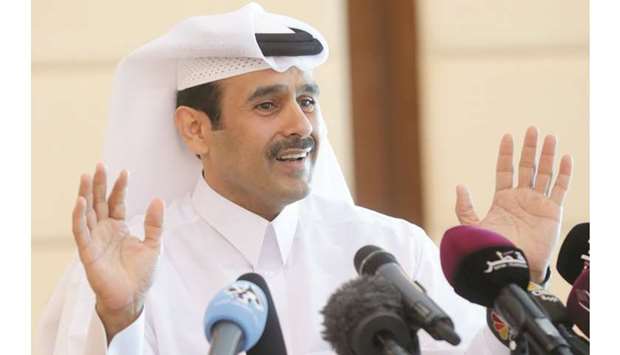Qatar will continue to produce oil and seek deals in countries including Latin America’s top oil producer Brazil, said HE the Minister of State for Energy Affairs Saad bin Sherida al-Kaabi.
“We are not saying we are going to get out of the oil business, but gas production would remain Qatar’s top priority,” al-Kaabi said at a press conference yesterday, where he announced Qatar’s decision to withdraw from the Organisation of the Petroleum Exporting Countries (Opec) in January, 2019.
“As you all know, Qatar has worked diligently during the past few years to develop a future strategy in the oil and gas sector based on growth and expansion, both in its activities in Qatar and internationally.
“This strategy,” he underlined, “has driven the expansion of our international upstream footprint to reach countries like Brazil, Mexico, Argentina, Cyprus, Congo, South Africa, and the Sultanate of Oman, to name a few. Moreover, in the next few months we will be announcing several major international partnerships.”
Al-Kaabi said gas production would remain the top priority for Qatar. Already, the country is the biggest exporter of liquefied natural gas at 77mn tonnes a year. Qatar Petroleum is working on plans to develop and increase the country’s LNG output to 110mn tonnes by 2024.
“We don’t have great potential (in oil), we are very realistic… Our potential is gas,” said al-Kaabi.
“I think it’s inefficient to focus on something that’s not your core business and something that’s not going to benefit you long-term.”
He said Doha would focus on its gas potential because it was not practical “to put efforts and resources and time in an organisation that we are a very small player in and I don’t have a say in what happens.”
Qatar would “make a big splash in the oil and gas business soon,” al-Kaabi said adding Doha would also build the Middle East’s biggest ethane cracker, an industrial facility, which converts gas to by-products such as adhesives and ethylene for plastics.
When the North Field expansion project is completed and all four new trains are online, Qatar’s LNG production capacity will reach 110mn tonnes a year. This will increase Qatar’s total production capacity from 4.8mn to 6.2mn barrels of oil equivalent per day.
The new capacity increase will further strengthen Qatar’s leading position as the world’s largest LNG producer and exporter, and will further boost QP’s strategic growth plan. This production addition will have a great impact on Qatar’s economic growth and will help stimulate the country’s local economy.

HE al-Kaabi: u201cWe are not saying we are going to get out of the oil business, but gas production would remain the top priority for Qatar.u201d

